- Home
- Mrs. Humphry Ward
Helena Page 2
Helena Read online
Page 2
CHAPTER II
"There is only one bathroom in this house, and it is a day's journey tofind it," said Helena, re-entering her own bedroom, where she had leftMrs. Friend in a dimity-covered arm-chair by the window, while shereconnoitred. "Also, the water is only a point or two above freezing--andas I like boiling--"
She threw herself down on the floor by Mrs. Friend's side. All hermovements had a curious certainty and grace like those of a beautifulanimal, but the whole impression of her was still formidable to thegentle creature who was about to undertake what already seemed to her theabsurd task of chaperoning anything so independent and self-confident.But the girl clearly wished to make friends with her new companion, andbegan eagerly to ask questions.
"How did you hear of me? Do you mind telling me?"
"Just through an agency," said Mrs. Friend, flushing a little. "I wantedto leave the situation I was in, and the agency told me Lord Buntingfordwas looking for a companion for his ward, and I was to go and see LadyMary Chance--"
The girl's merry laugh broke out:
"Oh, I know Mary Chance--twenty pokers up her backbone! I should havethought--"
Then she stopped, looking intently at Mrs. Friend, her brows drawntogether over her brilliant eyes.
"What would you have thought?" Mrs. Friend enquired, as the silencecontinued.
"Well--that if she was going to recommend somebody to Cousin Philip--tolook after me, she would never have been content with anything short of aPrussian grenadier in petticoats. She thinks me a demon. She won't lether daughters go about with me. I can't imagine how she ever fixed uponanyone so--"
"So what?" said Mrs. Friend, after a moment, nervously. Lost in the bigwhite arm-chair, her small hand propping her small face and head, shelooked even frailer than she had looked in the library.
"Well, nobody would ever take you for my jailer, would they?" saidHelena, surveying her.
Mrs. Friend laughed--a ghost of a laugh, which yet seemed to have somefun in it, far away.
"Does this seem to you like prison?"
"This house? Oh, no. Of course I shall do just as I like in it. I haveonly come because--well, my poor Mummy made a great point of it when shewas ill, and I couldn't be a brute to her, so I promised. But I wonderwhether I ought to have promised. It is a great tyranny, you know--thetyranny of sick people. I wonder whether one ought to give in to her?"
The girl looked up coolly. Mrs. Friend felt as though she had beenstruck.
"But your _mother_!" she said involuntarily.
"Oh, I know, that's what most people would say. But the question is,what's reasonable. Well, I wasn't reasonable, and here I am. But I makemy conditions. We are not to be more than four months in the year in thisold hole"--she looked round her in not unkindly amusement at the bareold-fashioned room; "we are to have four or five months in London, _atleast_; and when travelling abroad gets decent again, we are to goabroad--Rome, perhaps, next winter. And I am jolly well to ask my friendshere, or in town--male and female--and Cousin Philip promised to be niceto them. He said, of course, 'Within limits.' But that we shall see. I'mnot a pauper, you know. My trustees pay Lord Buntingford whatever I costhim, and I shall have a good deal to spend. I shall have a horse--andperhaps a little motor. The chauffeur here is a fractious idiot. He hasdone that Rolls-Royce car of Cousin Philip's balmy, and cut up quiterough when I spoke to him about it."
"Done it what?" said Mrs. Friend faintly.
"Balmy. Don't you know that expression?" Helena, on the floor with herhands under her knees, watched her companion's looks with a grin. "It's_our_ language now, you know--English--the language of us young people.The old ones have got to learn it, as _we_ speak it! Well, what do youthink of Cousin Philip?"
Mrs. Friend roused herself.
"I've only seen him for half an hour. But he was very kind."
"And isn't he good-looking?" said the girl before her, with enthusiasm."I just adore that combination of black hair and blue eyes--don't you?But he isn't by any means as innocent as he looks."
"I never said--"
"No. I know you didn't," said Helena serenely; "but you might have--andhe isn't innocent a bit. He's as complex as you make 'em. Most women arein love with him, except me!" The brown eyes stared meditatively out ofwindow. "I suppose I could be if I tried. But he doesn't attract me.He's too old."
"Old?" repeated Mrs. Friend, with astonishment.
"Well, I don't mean he's decrepit! But he's forty-four if he's aday--more than double my age. Did you notice that he's a little lame?"
"No!"
"He is. It's very slight--an accident, I believe--somewhere abroad. Butthey wouldn't have him for the Army, and he was awfully cut up. He usedto come and sit with Mummy every day and pour out his woes. I suppose shewas the only person to whom he ever talked about his private affairs--heknew she was safe. Of course you know he is a widower?"
Mrs. Friend knew nothing. But she was vaguely surprised.
"Oh, well, a good many people know that--though Mummy always said shenever came across anybody who had ever seen his wife. He married her whenhe was quite a boy---abroad somewhere--when there seemed no chance of hisever being Lord Buntingford--he had two elder brothers who died--and shewas an art student on her own. An old uncle of Mummy's once told me thatwhen Cousin Philip came back from abroad--she died abroad--after herdeath, he seemed altogether changed somehow. But he never, _never_ speaksof her"--the girl swayed her slim body backwards and forwards foremphasis--"and I wouldn't advise you or anybody else to try. Most peoplethink he's just a bachelor. I never talk about it to people--Mummy said Iwasn't to--and as he was very nice to Mummy--well, I don't. But I thoughtyou'd better know. And now I think we'd better dress."
But instead of moving, she looked down affectionately at her uniform andher neat brown leggings.
"What a bore! I suppose I've no right to them any more."
"What is your uniform?"
"Women Ambulance Drivers. Don't you know the hostel in Ruby Square? Ibargained with Cousin Philip after Mummy's death I should stay out mytime, till I was demobbed. Awfully jolly time I had--on the whole--thoughthe girls were a mixed lot. Well--let's get a move on." She sprang up."Your room's next door."
Mrs. Friend was departing when Helena enquired:
"By the way--have you ever heard of Cynthia Welwyn?"
Mrs. Friend turned at the door, and shook her head.
"Oh, well, I can tot her up very quickly--just to give you an idea--asshe's coming to dinner. She's fair and forty--just about Buntingford'sage--quite good-looking--quite clever--lives by herself, reads a greatdeal--runs the parish--you know the kind of thing. They swarm! I thinkshe would like to marry Cousin Philip, if he would let her."
Mrs. Friend hurriedly shut the door at her back, which had been slightlyajar. Helena laughed--the merry but very soft laugh Mrs. Friend had firstheard in the hall--a laugh which seemed somehow out of keeping with therest of its owner's personality.
"Don't be alarmed. I doubt whether that would be news to anybody in thishouse! But Buntingford's quite her match. Well, ta-ta. Shall I come andhelp you dress?"
"The idea!" cried Mrs. Friend. "Shall I help you?" She looked roundthe room and at Helena vigorously tackling the boxes. "I thought youhad a maid?"
"Not at all. I couldn't be bored with one."
"Do let me help you!"
"Then you'd be my maid, and I should bully you and detest you. You mustgo and dress."
And Mrs. Friend found herself gently pushed out of the room. She went toher own in some bewilderment. After having been immured for some threeyears in close attendance on an invalided woman shut up in two rooms, shewas like a person walking along a dark road and suddenly caught in theglare of motor lamps. Brought into contact with such a personality asHelena Pitstone promised to be, she felt helpless and half blind. Asurvival, too; for this world into which she had now stepped was onequite new to her. Yet when she had first shut herself up in LancasterGate she had never been conscious of any gr
eat difference between herselfand other women or girls. She had lived a very quiet life in a quiet homebefore the war. Her father, a hard-working Civil Servant on a smallincome, and her mother, the daughter of a Wesleyan Minister, had broughther up strictly, yet with affection. The ways of the house wereold-fashioned, dictated by an instinctive dislike of persons who wentoften to theatres and dances, of women who smoked, or played bridge, orindulged in loud, slangy talk. Dictated, too, by a pervading "worship ofancestors," of a preceding generation of plain evangelical men and women,whose books survived in the little house, and whose portraits hung uponits walls.
Then, in the first year of the war, she had married a young soldier, theson of family friends, like-minded with her own people, a modest,inarticulate fellow, who had been killed at Festubert. She had lovedhim--oh, yes, she had loved him. But sometimes, looking back, she wastroubled to feel how shadowy he had become to her. Not in the region ofemotion. She had pined for his fondness all these years; she pined for itstill. But intellectually. If he had lived, how would he have felttowards all these strange things that the war had brought about--therevolutionary spirit everywhere, the changes come and coming? She did notknow; she could not imagine. And it troubled her that she could not findany guidance for herself in her memories of him.
And as to the changes in her own sex, they seemed to have all come aboutwhile she was sitting in a twilight room reading aloud to an old woman.Only a few months after her husband's death her parents had both died,and she found herself alone in the world, and almost penniless. She wasnot strong enough for war work, the doctor said, and so she had let thedoors of Lancaster Gate close upon her, only looking for something quietand settled--even if it were a settled slavery.
After which, suddenly, just about the time of the Armistice, she hadbecome aware that nothing was the same; that the women and the girls--somany of them in uniform!--that she met in the streets when she took herdaily walk--were new creatures; not attractive to her as a whole, butsurprising and formidable, because of the sheer life there was in them.And she herself began to get restive; to realize that she was notherself so very old, and to want to know--a hundred things! It had takenher five months, however, to make up her mind; and then at last she hadgone to an agency--the only way she knew--and had braved the cold andpurely selfish wrath of the household she was leaving. And now here shewas in Lord Buntingford's house--Miss Helena Pitstone's chaperon. As shestood before her looking-glass, fastening her little black dress withshaking fingers, the first impression of Helena's personality was uponher, running through her, like wine to the unaccustomed. She supposedthat now girls were all like this--all such free, wild, uncurbedcreatures, a law to themselves. One moment she repeated that she was afool to have come; and the next, she would not have found herself backin Lancaster Gate for the world.
* * * * *
Meanwhile, in the adjoining room, Helena was putting on a tea-gown, awhite and silver "confection," with a little tail like a fish, and ashort skirt tapering down to a pair of slim legs and shapely feet. Afterall her protestations, she had allowed the housemaid to help her unpack,and when the dress was on she had sent Mary flying down to thedrawing-room to bring up some carnations she had noticed there. Whenthese had been tucked into her belt, and the waves of her brown hair hadbeen somehow pinned and coiled into a kind of order, and she haddiscovered and put on her mother's pearls, she was pleased with herself,or rather with as much of herself as she could see in the inadequatelooking-glass on the toilet-table. A pier-glass from somewhere was ofcourse the prime necessity, and must be got immediately. Meanwhile shehad to be content with seeing herself in the eyes of the housemaid, whowas clearly dazzled by her appearance.
Then there were a few minutes before dinner, and she ran along thepassage to Mrs. Friend's room.
"May I come in? Oh, let me tie that for you?" And before Mrs. Friendcould interpose, the girl's nimble fingers had tied the narrow velvetcarrying a round locket which was her chaperon's only ornament. Drawingback a little, she looked critically at the general effect. Mrs. Friendflushed, and presently started in alarm, when Helena took up the comblying on the dressing-table.
"What are you going to do?"
"Only just to alter your hair a little. Do you mind? Do let me. You lookso nice in black. But your hair is too tight."
Mrs. Friend stood paralysed, while with a few soft touches Helenaapplied the comb.
"Now, isn't that nice! I declare it's charming! Now look at yourself. Whyshould you make yourself look dowdy? It's all very well--but you can't bemuch older than I am!"
And dancing round her victim, Helena effected first one slightimprovement and then another in Mrs. Friend's toilette, till the littlewoman, standing in uneasy astonishment before the glass to which Helenahad dragged her, plucked up courage at last to put an end to theproceedings.
"No, please don't!" she said, with decision, warding off the girl'smeddling hand, and putting back some of the quiet bands of hair. "Youmustn't make me look so unlike myself. And besides--I couldn't live up toit!" Her shy smile broke out.
"Oh, yes, you could. You're quite nice-looking. I wonder if you'd mindtelling me how old you are? And must I always call you 'Mrs. Friend'? Itis so odd--when everybody calls each other by their Christian names."
"I don't mind--I don't mind at all. But don't you think--for both oursakes--you'd better leave me all the dignity you can?" Laughter wasplaying round the speaker's small pale lips, and Helena answered itwith interest.
"Does that mean that you'll have to manage me? Did Cousin Philiptell you you must? But that--I may as well tell you at once--is a vaindelusion. Nobody ever managed me! Oh, yes, my superior officer in theWomen's Corps--she was master. But that was because I chose to make herso. Now I'm on my own--and all I can offer--I'm afraid!--is analliance--offensive and defensive."
Mrs. Friend looked at the radiant vision opposite to her with its handson its sides, and slowly shook her head.
"Offensive--against whom?"
"Cousin Philip--if necessary."
Mrs. Friend again shook her head.
"Oh, you're in his pocket already!" cried Helena with a grimace. "Butnever mind. I'm sure I shall like you. You'll come over to my side soon."
"Why should I take any side?" asked Mrs. Friend, drawing on a pair ofblack gloves.
"Well, because"--said Helena slowly--"Cousin Philip doesn't like some ofmy pals--some of the men, I mean--I go about with--and we _may_ quarrelabout it. The question is which of them I'm going to marry--if I marryany of them. And some of them are married. Don't look shocked! Oh,heavens, there's the gong! But we'll sit up to-night, if you're notsleepy, and I'll give you a complete catalogue of some of theirqualifications--physical, intellectual, financial. Then you'll have the_carte du pays_. Two of them are coming to-morrow for the Sunday. There'snobody coming to-night of the least interest. Cynthia Welwyn, CaptainVivian Lodge, Buntingford's cousin--rather a prig--but good-looking. Agirl or two, no doubt--probably the parson--probably the agent. Now youknow. Shall we go down?"
* * * * *
The library was already full when the two ladies entered. Mrs. Friend wasaware of a tall fair woman, beautifully dressed in black, standing byLord Buntingford; of an officer in uniform, resplendent in red tabs anddecorations, talking to a spare grey-haired man, who might be supposed tobe the agent; of a man in a round collar and clerical coat, standingawkward and silent by the tall lady in black; and of various other girlsand young men.
All eyes were turned to Helena as she entered, and she was soonsurrounded, while Lord Buntingford took special care of Helena'scompanion. Mrs. Friend found herself introduced to Lady Cynthia Welwyn,the tall lady in black; to Mr. Parish, the grey-haired man, and to theclergyman. Lady Cynthia bestowed on her a glance from a pair of prominenteyes, and a few civil remarks, Mr. Parish made her an old-fashioned bow,and hoped she had not found the journey too dusty, while the clergyman,whose name she caught as Mr. Alcott, show
ed a sudden animation as theyshook hands, and had soon put her at her ease by a manner in which she atonce divined a special sympathy for the stranger within the gates.
"You have just come, I gather?"
"I only arrived this afternoon."
"And you are to look after Miss Helena?" he smiled.
Mrs. Friend smiled too.
"I hope so. If she will let me!"
"She is a radiant creature!" And for a moment he stood watching the girl,as she stood, goddess-like, amid her group of admirers. His eyes weredeep-set and tired; his scanty grizzled hair fell untidily over afurrowed brow; and his clothes were neither fresh nor well-brushed. Butthere was something about him which attracted the lonely; and Mrs. Friendwas glad when she found herself assigned to him.
But though her neighbour was not difficult to talk to, her surroundingswere so absorbing to her that she talked very little at dinner. It wasenough to listen and look--at Lady Cynthia on Lord Buntingford's righthand, and Helena Pitstone on his left; or at the handsome officer withwhom Helena seemed to be happily flirting through a great part of dinner.Lady Cynthia was extremely good-looking, and evidently agreeable, thoughit seemed to Mrs. Friend that Lord Buntingford only gave her dividedattention. Meanwhile it was very evident that he himself was the centreof his own table, the person of whom everyone at it was fundamentallyaware, however apparently busy with other people. She herself observedhim much more closely than before, the mingling in his face of a kind ofconcealed impatience, an eagerness held in chains and expressed by hisslight perpetual frown, with a courtesy and urbanity generally gay orbantering, but at times, and by flashes--or so it seemed to her--dippedin a sudden, profound melancholy, like a quenched light. He held himselfsharply erect, and in his plain naval uniform, with the three Commander'sstripes on the sleeve, made, in her eyes, an even more distinguishedfigure than the gallant and decorated hero on his left, with whom Helenaseemed to be so particularly engaged, "prig" though she had dubbed him.
As to Lady Cynthia's effect upon her host, Mrs. Friend could not make upher mind. He seemed attentive or amused while she chatted to him; buttowards the end their conversation languished a good deal, and LadyCynthia must needs fall back on the stubby-haired boy to her right, whowas learning agency business with Mr. Parish. She smiled at him also, forit was her business, Mrs. Friend thought, to smile at everybody, but itwas an absent-minded smile.
"You don't know Lord Buntingford?" said Mr. Alcott's rather muffled voicebeside her.
Mrs. Friend turned hastily.
"No--I never saw him till this afternoon."
"He isn't easy to know. I know him very little, though he gave me thisliving, and I have business with him, of course, occasionally. But this Ido know, the world is uncommonly full of people--don't you find itso?--who say 'I go, Sir'--and don't go. Well, if Lord Buntingford says 'Igo, Sir'--he does go!"
"Does he often say it?" asked Mrs. Friend. And the man beside her noticedthe sudden gleam in her quiet little face, that rare or evanescent spriteof laughter or satire that even the dwellers in Lancaster Gate hadoccasionally noticed.
Mr. Alcott considered.
"Well, no," he said at last. "I admit he's difficult to catch. He likeshis own ways a great deal better than other people's. But if you docatch him--if you do persuade him--well, then you can stake your bottomdollar on him. At least, that's my experience. He's been awfullygenerous about land here--put a lot in my hands to distribute longbefore the war ended. Some of the neighbours about--otherlandlords--were very sick--thought he'd given them away because of theterms. They sent him a round robin. I doubt if he read it. In a thinglike that he's adamant. And he's adamant, too, when he's once taken areal dislike to anybody. There's no moving him."
"You make me afraid!" said Mrs. Friend.
"Oh, no, you needn't be--" Mr. Alcott turned almost eagerly to look ather. "I hope you won't be. He's the kindest of men. It's extraordinarilykind of him--don't you think?"--the speaker smilingly lowered hisvoice--"taking on Miss Pitstone like this? It's a great responsibility."
Mrs. Friend made the slightest timid gesture of assent.
"Ah, well, it's just like him. He was devoted to her mother--and for hisfriends he'll do anything. But I don't want to make a saint of him. Hecan be a dour man when he likes--and he and I fight about a good manythings. I don't think he has much faith in the new England we're alltalking about--though he tries to go with it. Have you?" He turned uponher suddenly.
Mrs. Friend felt a pang.
"I don't know anything," she said, and he was conscious of the agitationin her tone. "Since my husband died, I've been so out of everything."
And encouraged by the kind eyes in the plain face, she told her story,very simply and briefly. In the general clatter and hubbub of the tableno one overheard or noticed.
"H'm--you're stepping out into the world again as one might step out ofa nunnery--after five years. I rather envy you. You'll see things fresh.Whereas we--who have been through the ferment and the horror--" He brokeoff--"I was at the front, you see, for nearly two years--then I gotinvalided. So you've hardly realized the war--hardly known there was awar--not since--since Festubert?"
"It's dreadful!" she said humbly--"I'm afraid I know just nothingabout it."
He looked at her with a friendly wonder, and she, flushing deeper, wasglad to see him claimed by a lively girl on his left, while she fellback on Mr. Parish, the agent, who, however, seemed to be absorbed inthe amazing--and agreeable--fact that Lord Buntingford, though he drankno wine himself, had yet some Moet-et-Charidon of 1904 left to give tohis guests. Mr. Parish, as he sipped it, realized that the war wasindeed over.
But, all the time, he gave a certain amount of scrutiny to the littlelady beside him. So she was to be "companion" to Miss HelenaPitstone--to prevent her getting into scrapes--if she could. LordBuntingford had told him that his cousin, Lady Mary Chance, had chosenher. Lady Mary had reported that "companions" were almost as difficultto find as kitchenmaids, and that she had done her best for him infinding a person of gentle manners and quiet antecedents. "Such peoplewill soon be as rare as snakes in Ireland"--had been the concludingsentence in Lady Mary's letter, according to Lord Buntingford's laughingaccount of it. Ah, well, Lady Mary was old-fashioned. He hoped the youngwidow might be useful; but he had his doubts. She looked a weak vesselto be matching herself with anything so handsome and so pronounced asthe young lady opposite.
Why, the young lady was already quarrelling with her guardian! For thewhole table had suddenly become aware of a gust in the neighbourhood ofLord Buntingford--a gust of heated talk--although the only heated personseemed to be Miss Pitstone. Lord Buntingford was saying very little; butwhatever he did say was having a remarkable effect on his neighbour.Then, before the table knew what it was all about, it was over. LordBuntingford had turned resolutely away, and was devoting himself toconversation with Lady Cynthia, while his ward was waging a fresh war ofrepartee with the distinguished soldier beside her, in which hersharpened tones and quick breathing suggested the swell after a storm.
Mrs. Friend too had noticed. She had been struck with the suddentightening of the guardian's lip, the sudden stiffening of his hand lyingon the table. She wondered anxiously what was the matter.
In the library afterwards, Lady Cynthia, Mrs. Friend, and the twogirls--his daughter and his guest--who had come with Mr. Parish, settledinto a little circle near the wood-fire which the chilliness of the Mayevening made pleasant.
Helena Pitstone meanwhile walked away by herself to a distant part of theroom and turned over photographs, with what seemed to Mrs. Friend astormy hand. And as she did so, everyone in the room was aware of her, ofthe brilliance and power of the girl's beauty, and of the energy thatlike an aura seemed to envelop her personality. Lady Cynthia made severalattempts to capture her, but in vain. Helena would only answer inmonosyllables, and if approached, retreated further into the dim room,ostensibly in search of a book on a distant shelf, really in flight. LadyCynthia, with a shrug, gave
it up.
Mrs. Friend felt too strange to the whole situation to make any move. Shecould only watch for the entry of the gentlemen. Lord Buntingford, whocame in last, evidently looked round for his ward. But Helena had alreadyflitted back to the rest of the company, and admirably set off by a deepred chair into which she had thrown herself, was soon flirtingunashamedly with the two young men, with Mr. Parish and the Rector,taking them all on in turn, and suiting the bait to the fish with theinstinctive art of her kind. Lord Buntingford got not a word with her,and when the guests departed she had vanished upstairs before anyone knewthat she had gone.
"Have a cigar in the garden, Vivian, before you turn in? There is a moon,and it is warmer outside than in," said Lord Buntingford to his cousin,when they were left alone.
"By all means."
So presently they found themselves pacing a flagged path outside a longconservatory which covered one side of the house. The moon was cloudy,and the temperature low. But the scents of summer were already in theair--of grass and young leaf, and the first lilac. The old grey housewith its haphazard outline and ugly detail acquired a certain dignityfrom the night, and round it stretched dim slopes of pasture, with oaksrising here and there from bands of white mist.
"Is that tale true you told me before dinner about Jim Donald?" said LordBuntingford abruptly. "You're sure it's true--honour bright?"
The other laughed.
"Why, I had it from Jim himself!" He laughed. "He just made a joke of it.But he is a mean skunk! I've found out since that he wanted to buyPreston out for the part Preston had taken in another affair. There's apretty case coming on directly, with Jim for hero. You have heard of it."
"No," said Buntingford curtly; "but in any case nothing would haveinduced me to have him here. Preston's a friend of mine. So when Helenatold me at dinner she had asked him for Saturday, I had to tell her Ishould telegraph to him to-morrow morning not to come. She was angry,of course."
Captain Lodge gave a low whistle. "Of course she doesn't know. But Ithink you would be wise to stop it. And I remember now she danced allnight with him at the Arts Ball!"

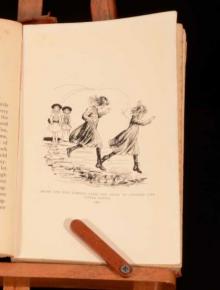 Milly and Olly
Milly and Olly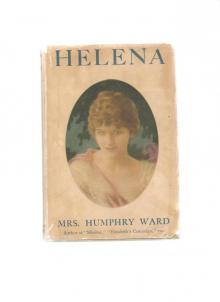 Helena
Helena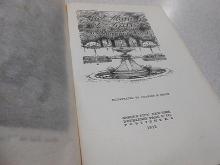 The Mating of Lydia
The Mating of Lydia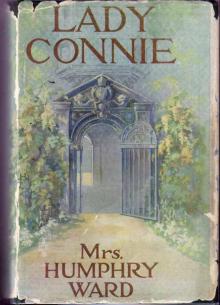 Lady Connie
Lady Connie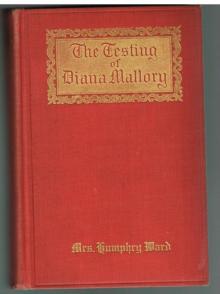 The Testing of Diana Mallory
The Testing of Diana Mallory